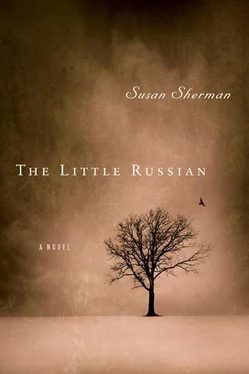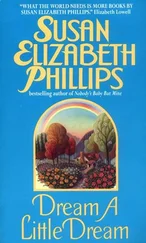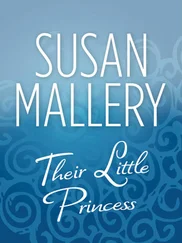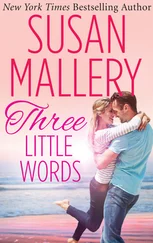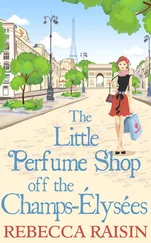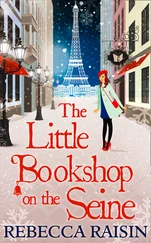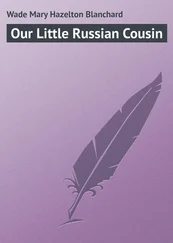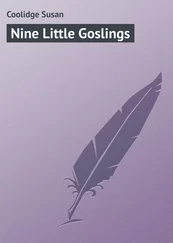They drove out on the Cherkast road that led north to the wheat center of the same name. It was a wide ribbon of gravel bisecting the rolling fields of half-reaped wheat, the tawny shafts standing straight and tall in the sunlight, casting straight-edged shadows over the stubble left behind by the scythe. Here and there were one-story houses built of logs and plaster, covered with thatched mansard roofs and surrounded by a variety of defeated outbuildings. The yards were typically littered with years of farm trash: broken-down carts, rusted-out tubs, bits and pieces of old scythes and sledge runners and stacks of moldy crates. There was always a dog or two in the yard that barked as they rode past.
They turned in on one of the back roads, the droshky bouncing along the dusty track, the bells jingling on the harness, the springs squeaking like startled mice. It was one of those hypnotic days, warm and drowsy. There was a hectic surge of excitement inside Berta, an urge to let it all in: the sun, the smell of the black earth, the caress of muslin against her back. Her senses were alive and for the first time in a long while she felt the thrill of freedom—from the store, from the town, from the life she had fallen into since leaving Leontievsky Street.
Hershel pulled into a rutted drive that led down to a farmstead just off the main road. “This shouldn’t take long,” he said, bringing the droshky to a stop in front of a threshing shed whose roof nearly sagged to the ground. He jumped down. “Want to come along?”
She nodded and held out her arms so that he could help her down. Together they went up to the house, skirting rusting barrel hoops, a dung heap, beehives, and barking dogs the color of parched earth. At the door he stopped and waited. “Why don’t you just call out?” she asked.
“It’s considered bad luck. We just have to wait for someone to come. But it won’t be long with this racket.”
A moment later a woman with a baby on her hip appeared at the door and looked at them with suspicion. She wore a faded skirt and a gaudy head scarf and shooed the dogs away with a wave of her hand. Hershel tipped his hat and asked in Surzhyk for the whereabouts of the bol’shak . The baby began to fuss so she stuck a finger in its mouth while she nodded over to one of the larger outbuildings.
They found the bol’shak and his sons repairing harnesses in the barn, a rambling structure with stalls on one side, battered work benches on the other, and a hayloft in the back. The boys had the same light hair, flat wide face, rounded nose, and suspicious mouth of their father.
At first Hershel and Berta stood at the barn door, aware that they hadn’t been invited in. Hershel wished them a good day and said he’d come to buy their wheat. He was speaking Surzhyk like a muzhik and this seemed to lessen the tension. They knew he was a Jew, but a Jew who had taken the time to learn their language. Berta may have been reading into it, but it seemed to her that he had gained some respect for his efforts, especially with the bol’shak , who motioned them in.
Berta could barely speak the language, a mishmash of Russian and Ukrainian, but she had picked up enough working in the store to get the gist of what was being discussed. Hershel was saying something about a cow and their neighbor, possibly calling into question their neighbor’s skill at husbandry, and this they found uproariously funny. They talked about beehives. Hershel complimented the bol’shak on the hives they had seen on the drive. The old man took it in stride. After that she lost the thread of the conversation until the bol’shak invited them into his home for bread and salt.
The house was well kept for that part of the country, although the walls, which had been whitewashed once, were nearly black with soot and grime. They sat at a long farm table and ate bread slathered in lard topped with stout granules of salt, which they washed down with kvass served in jam jars. The men smoked their pipes filled with the foul-smelling makhorka . They weren’t in a hurry to get down to business and the conversation meandered over taxes, the purchase of a new horse, and the design of a new steam-powered threshing machine from Germany.
After the bread was consumed and several more glasses of kvass were drunk along with some vodka, Hershel and the bol’shak finally got down to talking about money. At first they started out far apart, but over time Hershel was able to bring the price down. He didn’t do it by belittling the man’s wheat as other merchants would have done. He did it by praising all the wheat in the region and implying that if he didn’t get his price here, there would be plenty of other places he could go. Finally, when they got down to haggling over two kopecks a pood, Hershel excused himself and went out to the carriage. He came back in carrying a sack of coins, which he emptied out on the table. Hundreds of shiny new kopecks spilled out over the worn planks and rolled through specks of salt and the sweat from the cold glasses . There were two- and three-kopeck coins, some five-kopeck, and a few grivenniki , ten-kopeck coins, all sparkling in the light that poured in through the open doorway. When the bol’shak saw the mound of coins he grinned and Berta saw that he was missing several teeth.
After the deal was struck, Hershel shook the man’s hand. The bol’shak walked them out to the droshky while his sons and daughter-in-law watched from the porch. Berta climbed up and brushed off the bench with her gloved hand. Then Hershel climbed up beside her and, after saying good-bye, signaled the horse and started up the rutted lane.
“Once I figured out they’d rather have a sack of kopecks than a piece of paper with the czar’s picture on it, the rest was easy. I never cheat them. I always give them a fair price, but it’s my price. Next spring I plan on managing six more silos. I already talked to Knoop and he’s happy to give them to me. He knows I get the best wheat and nobody gets my price. And after that I thought I’d ask for a piece. They won’t turn me down. They can’t. They know I’ll go over to the competition if they do.”
She looked at him from under her hat. It was a look of admiration, not coy, but openly admiring, and he took it in with pleasure. “You’re good at this, aren’t you?” she asked.
“Am I?” he said, barely suppressing a smile. The horse trotted past wide swaths of ripened wheat. “This is Adamovich’s,” he said with a wave of his hand. “I own it. All of it. I bought it when it was only seed.” He didn’t mean that he actually owned the fields, only that the consortium in Moscow had bought the wheat. But he was so connected to his work that these lines were often blurred. “Already it looks to be one of the highest yields in the district. He’s used a new seed from America. And he’s got the best soil. You can taste it.”
“You taste the soil?”
“Of course.”
She made a face and he laughed carelessly. He had a nice laugh. They rode back under the trees, the sunlight spilling through the leaves and tattooing the ground. It was quiet with only the clip-clop of hooves and the occasional thrum of a steam-powered thresher far off in the fields to break the calm. When the road got rough she had to hold on to the side of the box for support, but even so, her shoulder swayed into his, creating a stir of desire.
She asked him where he grew up and he told her about the shtetl where he was born and about the gymnasium where he went to school.
“It’s called Leski. Not far from here. On the way to Cherkast.”
“And what about your parents? Do they still live there?”
His smile faded a bit and he looked away. “They’re dead.”
Читать дальше
